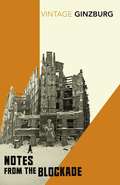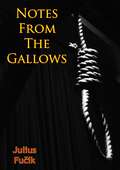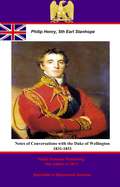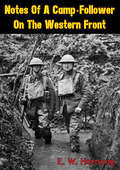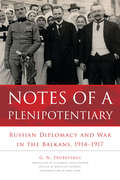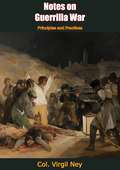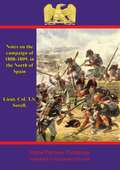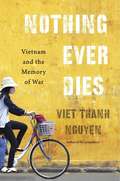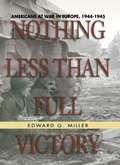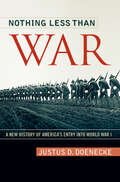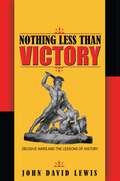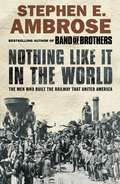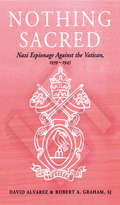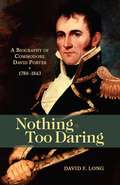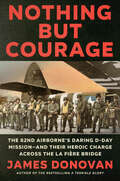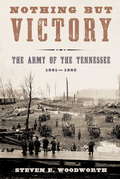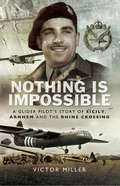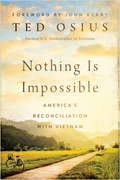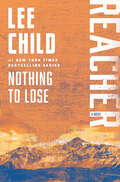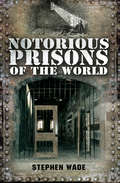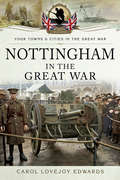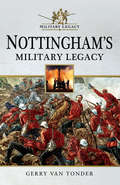- Table View
- List View
Notes from the Blockade
by Lydia GinzburgThe 900-day siege of Leningrad (1941-44) was one of the turning points of the Second World War. It slowed down the German advance into Russia and became a national symbol of survival and resistance. An estimated one million civilians died, most of them from cold and starvation. Lydia Ginzburg, a respected literary scholar (who meanwhile wrote prose 'for the desk drawer' through seven decades of Soviet rule), survived. Using her own using notes and sketches she wrote during the siege, along with conversations and impressions collected over the years, she distilled the collective experience of life under siege. Through painful depiction of the harrowing conditions of that period, Ginzburg created a paean to the dignity, vitality and resilience of the human spirit. This original translation by Alan Myers has been revised and annotated by Emily van Buskirk. This edition includes 'A Story of Pity and Cruelty', a recently discovered documentary narrative translated into English for the first time by Angela Livingstone.
Notes from the Gallows
by Julius Fucik Samuel SillenOn 24 April 1942, Czechoslovak journalist and active CPC member Julius Fucik was detained in Pankrác Prison in Prague, where he was subsequently interrogated and tortured, before being sent to Germany to stand trial for high treason.It was during this time that Fucik’s Notes from the Gallows (Czech: Reportáž psaná na oprátce, literally Reports Written Under the Noose) arose—written on pieces of cigarette paper and smuggled out by two sympathetic prison warders named Kolinsky and Hora.The notes were treated as great literary works after his death in 1943 and translated into many languages worldwide, resulting in this book, which was first published in English in 1948. It describes events in the prison since Fucik’s arrest and is filled with hope for a better, Communist future.
Notes of Conversations with the Duke of Wellington 1831-1851
by Pickle Partners Publishing Philip Henry, 5th Earl of StanhopeThis ebook is purpose built and is proof-read and re-type set from the original to provide an outstanding experience of reflowing text for an ebook reader. The notes that the 5th Earl Stanhope collected during his intimate friendship with the 1st Duke of Wellington, form an interesting and entertaining addition to the publications of the period and in particular the character and thoughts of the Duke himself. They are chronologically organised, in almost diarised format, and are clearly contemporaneous, Stanhope avoids adding much input of his own to the text, leaving the Duke words to be recorded verbatim. Although published after the Duke's death they are scrupulously cross-referenced with other publications such as the Croker Papers and the Greville memoirs which lends authenticity to the work. There is also a uniformity of character and phrase in the words that Wellington is quoted as saying, so as to lose none of their wit, verve, conservatism and in many cases severity of judgement. Stanhope, himself was no mean scholar, and a champion for the arts being a driving force behind the National Gallery in London. The text contains many insights into how Wellington viewed the world, his allies, and enemies, both political and on the field of battle. The anecdotes feature no less persons than the arch-schemer Prince Talleyrand, Prince Metternich, Field Marshal Blücher, Generals Gneisenau, Picton and Alava, the Royal families of Great Britain and France, Austria, Sir Robert Peel, Lord Castelreagh et al. Of particular interest are his views on the campaigns that made him famous and particularly of Napoleon; just to quote one example of the text 'I have heard, Sir, from military men that Napoleon's campaign to defend Paris was one of his most skilful?--"Excellent--quite excellent. The study of it has given me a greater idea of his genius than any other. Had he continued that system a little while longer, it is my opinion that he would have saved Paris. But he wanted patience--he did not see the necessity of adhering to defensive warfare.' Highly recommended The text, complete and unedited, of this edition is taken from the 1888 edition published by John Murray, London. Author - Philip Henry, 5th Earl Stanhope (30 January 1805 - 24 December 1875)
Notes of a Camp-Follower on the Western Front [Illustrated Edition]
by E. W. HornungIncludes the First World War Illustrations Pack - 73 battle plans and diagrams and 198 photosE. W. Hornung was a noted English author who wrote around the turn of the Twentieth Century, his most famous creation being the Gentleman Thief, Raffles. During the later years of the First World War (1917-1918), the author visited the military camps of the British army. He was particularly struck by the character of the soldiers in their moments of brief repose out of the firing line and decided to write a semi-fictionalized account of the camps. This volume 'Notes of a Camp-Follower on the Western Front' is that account; gripping, emotive and lucid, Hornung's clear style and vivid eye of detail recreates the British troops that fought in Flanders Fields.
Notes of a Plenipotentiary: Russian Diplomacy and War in the Balkans, 1914–1917 (NIU Series in Slavic, East European, and Eurasian Studies)
by G. N. TrubetskoiA prince in one of Russia's most exalted noble families, Grigorii N. Trubetskoi was a unique and contradictory figure during World War I. A lifelong civil servant and publicist, he began his diplomatic career in Constantinople, where he served as first secretary of the embassy there for several years. He became one of the leaders of an important political orientation among the liberals that began to express opposition to the tsar, not only on questions of political freedom and domestic political reform, but also by criticizing the tsar's foreign policy on nationalistic grounds. Trubetskoi possessed significant influence over Russian foreign policy and was instrumental in pushing the regime toward an aggressive annexationist stand in the Balkans. When the Russian ambassador to Serbia died suddenly in June of 1914, Trubetskoi was appointed as his replacement—situating him at the center of Russian diplomacy during the decisive period of Russia's entry into the war. His account of this period serves as an important reference for the study of the war's outbreak. Trubetskoi also discusses how he drafted the proclamation on Poland and gives a revealing account of its origins. A valuable source on the major historical problem of the entry of Turkey into the war, the narrative provides interesting details about agreements with Britain and France. Translated by Trubetskoi's granddaughter, Elizabeth Saika-Voivod, and featuring Trubetskoi's original photographs, this fascinating memoir provides an inside look at Russian foreign policies during crucial points of the war. It will appeal to scholars, students, and general readers interested in World War I and Russian history.
Notes on Guerrilla War: Principles and Practices
by Col. Virgil NeyThis book on Guerrilla War, by an American Officer, a student of and an operator in the field of Unconventional Warfare, is most opportune and timely. For the first time, in many instances Principles are identified and explained by historical examples. Colonel Ney holds to the belief that AMERICANS have a tradition of successful GUERRILLA WAR operations from the earliest days of the Nation’s history. Rogers, Marion, Boone, Mosby, Morgan, Quantrill, Ferguson, Andrews, Mackenzie, Funston, Pershing, McCoy, Fertig, Volckmann, Blackburn, Parker, Praeger, Calyer, McGee, Cushing, Anderson, Calvert, Ramsey, Straughn, Thorp, McLish, Childress, Lapham, Barnett: these and others have led or countered GUERILLAS. MARX did not invent GUERRILLA WAR, it was a military phenomenon centuries before his birth; but it has been seized and converted into a comfortable vehicle of Cold-War combat by International Communism. To defeat it, we must know what it is and how it works; to wage it we must understand its PRINCIPLES. That is why this book was written!
Notes on the campaign of 1808-1809, in the North of Spain
by Lieut.-Col. T.S. SorellFew campaigns have started with the British Army being so muddled, or so outnumbered as the campaign that Sir John Moore began in 1808. Sent out by the London government to take charge of British forces in Portugal and Spain, his appointment coincided with a major effort by the French to take the initiative in Spain. Napoleon, in person with 200,000 men, started his offensive as Sir John struggled with the divided Spanish Juntas, still suspicious of British intentions, terrible roads, few supplies and even worse information of the position of his allies or the French. Eventually forced to withdraw, he fought a brilliant defensive battle at Coruña, during which he lost his own life.Lt.-Col. Sorrell was witness to the trials and tribulations of General Moore, and defends his actions from critics whilst offering his own reminiscences of the campaign and the awful retreat to Coruña.Author -- Lieut.-Col. T.S. Sorell.Text taken, whole and complete, from the edition published in London: J. Murray, 1828.Original Page Count - 53 pages.
Nothing But A Smile
by Steve AmickIn his utterly charming story of a World War II veteran and an enterprising pinup girl, Steve Amick has created a beautifully understated love letter to an America of harder times and simpler choices. It's 1944, and Wink Dutton, a former illustrator for Yank and Stars and Stripes, arrives in Chicago after an injury to his drawing hand gets him discharged. Renting a room above the camera shop run by Sal Chesterton-the wife of Wink's buddy, still stationed in the Philippines-Wink is surprised to learn how Sal is making ends meet: producing pinup photos for the soldiers' girlie magazines. In fact, she's using herself as a model. When Wink becomes a partner in her covert enterprise, it's the beginning of a collaboration that is both wonderfully sexy and pure, one that not only leads to Wink's reinvention as a photographer but also-amid the painful adjustments of the postwar world-blossoms into a subtle and unexpected romance.
Nothing Ever Dies: Vietnam and the Memory of War
by Viet NguyenNothing Ever Dies, Viet Thanh Nguyen writes. All wars are fought twice, the first time on the battlefield, the second time in memory. From the author of the bestselling novel The Sympathizer comes a searching exploration of a conflict that lives on in the collective memory of both the Americans and the Vietnamese.
Nothing Less Than Full Victory
by Edward G MillerAt the onset of World War II, the U.S. Army was a third-rate ground force of 145,000 with some generals who still believed in the relevance of horse cavalry. Its soldiers were untrained, its doctrine out of date, and its weapons hopelessly obsolete. Four years later, the U.S. Army was engaged in a global war with a force of more than 8 million men armed with modern weapons and equipment. Nothing Less than Full Victory is the story of how American ground troops in Europe managed to defeat one of the most proficient armies in history. The author, a retired lieutenant colonel in the U.S. Army, draws on his twenty years of experience in military logistics and eight years of scholarly research to examine the Army s remarkable transformation. Focusing on areas rarely considered in other books on World War II, Edward G. Miller analyzes the performance of American soldiers in the 1944 45 campaign in western Europe against a background of logistics, organization, training, and deployment. In doing so, this groundbreaking work refutes decades of assumptions to reset the historical framework for comparison of U.S. and German performance over the course of the campaign. Lieutenant Colonel Miller s skillful melding of little-known individual and small-unit combat action with the various facets of generating, deploying, and projecting power allows the reader to understand as never before the true significance of what took place. This book is published in cooperation with the Association of the United States Army.
Nothing Less Than War: A New History of America's Entry into World War I (Studies In Conflict, Diplomacy And Peace Ser.)
by Justus D. Doenecke“An equally meticulous and lucid account” of the controversy that preceded the United States’ declaration of war in April 1917 (Historynet).When war broke out in Europe in 1914, political leaders in the United States were swayed by popular opinion to remain neutral; yet less than three years later, the nation declared war on Germany. In Nothing Less Than War: A New History of America’s Entry into World War I, Justus D. Doenecke examines the clash of opinions over the war during this transformative period and offers a fresh perspective on America’s decision to enter World War I.Praise for Nothing Less Than War“Nothing Less Than War combines careful attention to diplomacy with an excellent consideration of politics and public opinion. It is superb in detail, and even scholars well versed in the field will learn things they didn’t know before.” —John Milton Cooper Jr., author of Woodrow Wilson: A Biography“Nothing Less Than War is a thoughtful look at America’s entry into World War I. Based on impressive research, it carries the reader back to a very different time, reassesses the wide-ranging debate over the war in Europe, and provides a stimulating re-examination of the strengths and weaknesses of Woodrow Wilson’s leadership.”?Charles Neu“Doenecke paints intriguing portraits of leading figures, many now obscure, including Franklin Delano and Theodore Roosevelt and William Jennings Bryan, plus the rich stew of newspapers, magazines, organizations, diplomats, and propagandists who fought over this issue.” —Publisher Weekly (starred review)“Doenecke untangles and clarifies the national debate in great detail in this dense, well-documented study. It will be of great use to serious students and researchers of the Great War.” —Library Journal
Nothing Less than Victory: Decisive Wars and the Lessons of History
by John David LewisHow aggressive military strategies win wars, from ancient times to todayThe goal of war is to defeat the enemy's will to fight. But how this can be accomplished is a thorny issue. Nothing Less than Victory provocatively shows that aggressive, strategic military offenses can win wars and establish lasting peace, while defensive maneuvers have often led to prolonged carnage, indecision, and stalemate. Taking an ambitious and sweeping look at six major wars, from antiquity to World War II, John David Lewis shows how victorious military commanders have achieved long-term peace by identifying the core of the enemy's ideological, political, and social support for a war, fiercely striking at this objective, and demanding that the enemy acknowledges its defeat.Lewis examines the Greco-Persian and Theban wars, the Second Punic War, Aurelian's wars to reunify Rome, the American Civil War, and the Second World War. He considers successful examples of overwhelming force, such as the Greek mutilation of Xerxes' army and navy, the Theban-led invasion of the Spartan homeland, and Hannibal's attack against Italy—as well as failed tactics of defense, including Fabius's policy of delay, McClellan's retreat from Richmond, and Chamberlain's appeasement of Hitler. Lewis shows that a war's endurance rests in each side's reasoning, moral purpose, and commitment to fight, and why an effectively aimed, well-planned, and quickly executed offense can end a conflict and create the conditions needed for long-term peace.Recognizing the human motivations behind military conflicts, Nothing Less than Victory makes a powerful case for offensive actions in pursuit of peace.
Nothing Like It in the World: The Men Who Built the Railway That United America
by Stephen E. AmbroseNOTHING LIKE IT IN THE WORLD is the story of the men who built the transcontinental railroad – the investors who risked their businesses and money; the enlightened politicians who understood its importance; the engineers and surveyors who risked, and sometimes lost, their lives; and the Irish and Chinese immigrants, the defeated Confederate soldiers, and the other labourers who did the backbreaking and dangerous work on the tracks. The US government pitted two companies – the Union Pacific and the Central Pacific Railroads – against each other in a race for funding, encouraging speed over caution. Locomotives, rails and spikes were shipped from the East through Panama or around South America to the West, or lugged across the country to the Plains. In Ambrose's hands, this enterprise, with its huge expenditure of brainpower, muscle and sweat, comes vibrantly to life.
Nothing Sacred: Nazi Espionage Against the Vatican, 1939-1945 (Studies in Intelligence)
by David Alvarez Revd Robert GrahamNazi Germany considered the Catholic Church to be a serious threat to its domestic security and its international ambitions. In Germany, informants provided intelligence, but in Rome, German attempts to penetrate the Papacy were less successful - except for the codebreaking work.
Nothing Too Daring
by David LongCommodore David Dixon Porter made history when he took the Essex into the Pacific and crippled the British whaling industry in the War of 1812. He was the first to suggest that the U.S. Navy force open Japan. He was also court-martialed and convicted on charges arising out of his unauthorized invasion of Spanish Puerto Rico. He later sought to reverse his fortunes in the Mexican Navy, and consistently suffered chaos in his personal and financial affairs. As the first U.S. chargé d'affaires in Constantinople he established direct diplomatic relations between the U.S. and the Ottoman Empire.Porter was courageous, passionate, intelligent, far-sighted, dedicated, and generous. Yet he was at the same time impulsive, avaricious, hot-tempered, conceited, sometimes vicious, and finally paranoiac. Nothing Too Daring offers an objective, thoroughly researched biography of one of America's most colorful naval officers.
Nothing but Courage: The 82nd Airborne's Daring D-Day Mission--and Their Heroic Charge Across the La Fière Bridge
by James DonovanFrom the bestselling author of Shoot for the Moon and A Terrible Glory comes the dramatic story of the courageous paratroopers and glidermen of the 82nd Airborne, who risked their lives to seize and secure a small, centuries-old bridge in France that played a pivotal role in the success of D-Day.In June 1944, German and American forces converged on an insignificant bridge a few miles inland from the invasion beaches. If taken by the Nazis, the bridge might have gone down in history as the reason the Allies failed on D-Day.The narrow road over it was each side&’s conduit to victory. Continued Nazi control over the bridge near an old manoir known as La Fière—one of only two bridges in the region capable of supporting tanks and other heavy armor—would allow the Germans to reinforce their defenses at Utah Beach, one of the five landing areas chosen for Operation Overlord, the Allied invasion of Nazi-held Europe. But because control of the bridge was also essential to moving U.S. troops inland and off the beach, it could not simply be destroyed: it had to be taken—and held—by the Allies.This was part of the formidable mission of the 82nd Airborne, whose lightly armed but superbly trained troopers had dropped behind—and into—German lines five hours before the seaborne assault on Utah. While blocking enemy reinforcements, they had to seize and secure avenues of approach from the beaches to the interior of Normandy, including two bridges over the modest Merderet River and the key crossroads village of Sainte Mère Église. Failure would give Hitler enough time, and the opportunity, to build up the resources necessary to defeat the invasion and turn the tide for the Nazis. The village was taken early on D-Day, and the 82nd endured repeated attacks by much larger German forces. But the bridge at La Fière became a bloody three-day standoff against tanks and artillery that culminated in a near-suicidal charge across it and the narrow 500-yard causeway beyond—straight into the teeth of a fierce German defense ordered to hold it to the last man.
Nothing but Victory
by Steven E. WoodworthComposed almost entirely of Midwesterners and molded into a lean, skilled fighting machine by Ulysses S. Grant and William Tecumseh Sherman, the Army of the Tennessee marched directly into the heart of the Confederacy and won major victories at Shiloh and at the rebel strongholds of Vicksburg and Atlanta.Acclaimed historian Steven Woodworth has produced the first full consideration of this remarkable unit that has received less prestige than the famed Army of the Potomac but was responsible for the decisive victories that turned the tide of war toward the Union. The Army of the Tennessee also shaped the fortunes and futures of both Grant and Sherman, liberating them from civilian life and catapulting them onto the national stage as their triumphs grew. A thrilling account of how a cohesive fighting force is forged by the heat of battle and how a confidence born of repeated success could lead soldiers to expect "nothing but victory."From the Trade Paperback edition.
Nothing is Impossible: A Glider Pilot's Story of Sicily, Arnhem and the Rhine Crossing
by Victor MillerBattle is the severest test a man can be called upon to undergo; it can bring out the best in a man and the worst...The author of this book, Victor Miller, joined the Queen's Royal Regiment, at Guildford, upon the outbreak of the Second World War. He volunteered for the elite Glider Pilot Regiment upon its formation and passed, with above average marks, the RAF pilot training programme.From here, he was to take part in three of the most iconic airborne operations of the entire conflict. The invasion of Sicily, the Allies first attack in to Europe, where he was wounded and temporarily taken prisoner; Arnhem, where the 1st Airborne Division struck sixty-four miles behind enemy lines only to clash with two SS Armoured Panzer Divisions resulting in 80% losses in nine days; and the assault crossing of the Rhine, into Germany proper, with 'only' 30% losses.This remarkable story, jotted down shortly after each operation when the events were still vivid in the author's mind, is an astonishing record of skill, bravery, comradeship and resourcefulness which represents a fitting tribute to many fallen friends and colleagues. The book was published initially in 1994, before the author's death. This posthumous edition comes with brand new supplementary content, drawn together by the author's sons and family.
Nothing is Impossible: America's Reconciliation with Vietnam
by Ted OsiusToday Vietnam is one of America’s strongest international partners, with a thriving economy and a population that welcomes American visitors. How that relationship was formed is a twenty-year story of daring diplomacy and a careful thawing of tensions between the two countries after a lengthy war that cost nearly 60,000 American and more than two million Vietnamese lives. Ted Osius, former ambassador during the Obama administration, offers a vivid account, starting in the 1990s, of the various forms of diplomacy that made this reconciliation possible. He considers the leaders who put aside past traumas to work on creating a brighter future, including senators John McCain and John Kerry, two Vietnam veterans and ideological opponents who set aside their differences for a greater cause, and Pete Peterson—the former POW who became the first U.S. ambassador to a new Vietnam. Osius also draws upon his own experiences working first-hand with various Vietnamese leaders and traveling the country on bicycle to spotlight the ordinary Vietnamese people who have helped bring about their nation’s extraordinary renaissance. With a foreword by former Secretary of State John Kerry, Nothing Is Impossible tells an inspiring story of how international diplomacy can create a better world.
Nothing to Lose: A Jack Reacher Novel (Jack Reacher #12)
by Lee Child#1 NEW YORK TIMES BESTSELLER • Don&’t miss the hit streaming series Reacher! &“Explosive and nearly impossible to put down.&”—PeopleTwo small towns in the middle of nowhere: Hope and Despair. Between them, nothing but twelve miles of empty road. Jack Reacher can&’t find a ride, so he walks. All he wants is a cup of coffee. What he gets are four hostile locals, a vagrancy charge, and an order to move on. They&’re picking on the wrong guy. Reacher is a hard man. No job, no address, no baggage. Nothing at all, except hardheaded curiosity. What are the secrets that Despair seems so desperate to hide? With just one ally—a mysterious woman cop from Hope—and many enemies, Reacher goes up against a whole town, hunting the rich man at its core, cracking open his terrifying agenda, asking the question: Who has the edge—a man with everything to gain, or a man with nothing to lose?
Notorious Prisons of the World
by Stephen WadeA captivating history of doing time throughout the centuries: from England&’s medieval dungeons to America&’s supermax detention facilities. The first prisons were castle hellholes, places of neglect, oblivion, and slow death. Every civilization has had its dissenters, deviants, and political offenders, and so prisons became essential to the retention of power. As the centuries passed, and prisons were needed for other reprobates—such as debtors and common thieves—legal systems across the world began to cater to a growing variety of prisoners, and the business of incarceration began. Notorious Prisons of the World traces this development, from the state prisons of Athens and Rome, to the birth of the houses of correction and the penitentiary. Stephen Wade tells fascinating stories of the infamous penal colonies and state prisons across the stage of world history, from Alcatraz and Devil&’s Island to the fortress of Colditz, and from the Siberian gulags to the massive super jails sprouting across modern America. He also shares the stories of inmates and staff, political regimes, and the rise and fall of empires, all seen through the prison walls. In doing so, Wade throws light on the state-structured punishments which have stripped away individual freedoms. Sometimes with a degree of humanitarian concern, and sometimes through sheer barbarism.
Nottingham in the Great War (Your Towns & Cities in the Great War)
by Carol Lovejoy EdwardsThe years 1914-1918 cost many lives in the trenches of France and Belgium. Those trenches and the battles that were fought from them are well documented. But back home in towns and cities up and down the United Kingdom death and desperation were also apparent. Those left behind to carry on suffered from harsh winters, lack of food and fuel and flu epidemics. This is the story of the struggles of ordinary people with their everyday lives. It includes the opportunities presented to the criminal fraternity and the contribution that women made to the war effort by filling men's jobs and providing a home for the men to return to. If they were lucky enough to come home from the war.
Nottingham's Military Legacy (Military Legacy)
by Gerry van TonderTwo years after landing on English soil in 1066, William of Normandy erected a strategic castle at Nottingham, thereby creating an enduring military nexus through to the modern era.On 22 August 1642, in his endeavours to quash Parliamentarian insurrection in the Midlands, King Charles raised his standard over Nottingham Castle, a rallying call to all Royalists to support their monarch. Loyalty to the Crown was, however, divided, and before long Parliamentarian forces garrisoned the castle. Late in the eighteenth century, a town troop of Yeomanry was raised in Nottingham, the foundation of the future South Notts Yeomanry. The yeomanry assisted regular troops by helping restore peace during the so-called Bread Riots of 1795, at a time when many of the towns men had been committed to military duty during the French Revolutionary Wars. Five troops of the towns yeomanry were again called up for service during the civil unrest of the Luddite Riots of 181118. This pattern of service continued over several decades. Evolving into a regiment, the yeomanry were repeatedly deployed against civil dissenters the Nottingham Riot, and the Reform Bill and Chartist Riots.After seeing combat during the Peninsula Wars in 1815, in the latter half of the 1800s, the 59th (2nd Nottinghamshire) Regiment of Foot formed part of a British invasion force into Afghanistan from India, to curb Russian interventionism in this remote and desolate region. The outbreak of war in distant South Africa in 1899 placed enormous strain on Britains military capability. From Nottingham and other county towns, regiments of yeomanry, Hussars and Sherwood Rangers were dispatched to the hostile environment of the African veld. Nottinghams sons then answered a call to arms in their thousands, only to also perish in their thousands on the Godforsaken soils of France and Flanders during the holocaust that was the Great War. Through the Second World War to the present, Nottinghams military units underwent successive phases of metamorphosis from infantry to antiaircraft and searchlight formations, followed by the relatively recent absorption into a regional entity: the Mercian Regiment. Today, Nottinghams castle and surrounds bear the symbols of a rich and diverse military legacy symbols of remembrance, of tribute, and of a tableau of military pride from ancient times.
Nouveau départ (Libération #2)
by J. N. Ba TortugaLibération, tome 2Juste après avoir été libéré de l’armée, Eric Tremaine, soldat blessé au combat, tente de reconstruire sa vie, comme les docteurs ont réassemblé sa jambe brisée. Sans toit, car sa famille de Louisiane l’a rejeté, il se retrouve au Texas avec son ancien compagnon d’armée, Adam Winchester, et son petit-ami, Sage. Lorsqu’Eric décide d’arrêter de se morfondre, il est présenté à l’entraîneur Troy Daniels, qui a perdu ses deux jambes dans un accident lorsqu’il était adolescent. Troy sait ce que cela fait d’être en conflit avec son corps. Alors que la relation entre Eric et Troy ne commence pas de la meilleure des manières, les deux hommes trouvent rapidement un terrain d’entente en devenant amis, si ce n’est plus. Mais faire avancer les choses signifie trouver ce qu’ils ont à s’offrir mutuellement, avant d’être certains que l’amour ne leur causera pas plus de peine que de plaisir.
